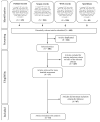Exergames in Childhood Obesity Treatment: A Systematic Review
- PMID: 34066369
- PMCID: PMC8124431
- DOI: 10.3390/ijerph18094938
Exergames in Childhood Obesity Treatment: A Systematic Review
Abstract
In the last decade, active video games (exergames) have been proposed in obesity prevention and treatment as a potential tool to increase physical activity. This review was aimed to assess the possible role of exergames in reducing weight-related outcomes among overweight/obese children and/or adolescents. The databases PubMed, Scopus, Web of Science and SPORTDiscus were interrogated to detect controlled studies involving healthy overweight/obese children and adolescents in interventions based exclusively on exergames. Out of a total of 648 articles found, 10 met the inclusion criteria and were included in the review. The included studies differ for duration, setting and type of intervention, frequency of active game sessions, and outcomes considered. Seven out of ten studies reported better outcomes in children/adolescents involved in the interventions, with significant differences between groups in four, while three studies found better outcomes in control groups. These results suggest a possible positive effect of active video games on weight-related outcomes in obese children and adolescents. However, further research is still needed to define if they can be effectively used in childhood obesity treatment and which may be the most effective approach. The potentiality of the new digital media in this field should be explored.
Keywords: active games; adolescent; children; exergames; obesity; overweight; weight loss.
Conflict of interest statement
The authors declare no conflict of interest.
Similar articles
-
Physical activity, diet and other behavioural interventions for improving cognition and school achievement in children and adolescents with obesity or overweight.Cochrane Database Syst Rev. 2018 Mar 2;3(3):CD009728. doi: 10.1002/14651858.CD009728.pub4. Cochrane Database Syst Rev. 2018. PMID: 29499084 Free PMC article.
-
Physical activity, diet and other behavioural interventions for improving cognition and school achievement in children and adolescents with obesity or overweight.Cochrane Database Syst Rev. 2018 Jan 29;1(1):CD009728. doi: 10.1002/14651858.CD009728.pub3. Cochrane Database Syst Rev. 2018. Update in: Cochrane Database Syst Rev. 2018 Mar 02;3:CD009728. doi: 10.1002/14651858.CD009728.pub4. PMID: 29376563 Free PMC article. Updated.
-
Home treatment for mental health problems: a systematic review.Health Technol Assess. 2001;5(15):1-139. doi: 10.3310/hta5150. Health Technol Assess. 2001. PMID: 11532236
-
Comparison of the effectiveness of inhaler devices in asthma and chronic obstructive airways disease: a systematic review of the literature.Health Technol Assess. 2001;5(26):1-149. doi: 10.3310/hta5260. Health Technol Assess. 2001. PMID: 11701099
-
Psychological and/or educational interventions for the prevention of depression in children and adolescents.Cochrane Database Syst Rev. 2004;(1):CD003380. doi: 10.1002/14651858.CD003380.pub2. Cochrane Database Syst Rev. 2004. Update in: Cochrane Database Syst Rev. 2011 Dec 07;(12):CD003380. doi: 10.1002/14651858.CD003380.pub3. PMID: 14974014 Updated.
Cited by
-
Media in the Moment: An Observational Assessment of the Digital Media Context in Early Childhood.Transl Issues Psychol Sci. 2023 Sep;9(3):186-198. doi: 10.1037/tps0000377. Transl Issues Psychol Sci. 2023. PMID: 38223906 Free PMC article.
-
Can Digital Technologies Be Useful for Weight Loss in Individuals with Overweight or Obesity? A Systematic Review.Healthcare (Basel). 2024 Mar 16;12(6):670. doi: 10.3390/healthcare12060670. Healthcare (Basel). 2024. PMID: 38540634 Free PMC article. Review.
-
Behavior Change Techniques in Physical Activity Interventions Targeting Overweight and Obese Children and Adolescents: A Systematic Review.Behav Sci (Basel). 2024 Nov 28;14(12):1143. doi: 10.3390/bs14121143. Behav Sci (Basel). 2024. PMID: 39767284 Free PMC article. Review.
-
Usability and Effects of a Combined Physical and Cognitive Intervention Based on Active Video Games for Preschool Children.Int J Environ Res Public Health. 2022 Jun 16;19(12):7420. doi: 10.3390/ijerph19127420. Int J Environ Res Public Health. 2022. PMID: 35742670 Free PMC article. Clinical Trial.
-
Effects of Playing Exergames on Quality of Life among Young Adults: A 12-Week Randomized Controlled Trial.Int J Environ Res Public Health. 2023 Jan 11;20(2):1359. doi: 10.3390/ijerph20021359. Int J Environ Res Public Health. 2023. PMID: 36674115 Free PMC article. Clinical Trial.
References
-
- World Health Organization Global Health Observatory Data Repository. [(accessed on 8 March 2021)]; Available online: https://apps.who.int/gho/data/view.main.BMIPLUS2REGv.
-
- World Health Organization Obesity and Overweight Fact Sheets. [(accessed on 8 March 2021)]; Available online: https://www.who.int/news-room/fact-sheets/detail/obesity-and-overweight.
-
- Kahan L.G., Mehrza R. Chapter 10—Environmental factors related to the obesity epidemic. Obesity. 2020:117–139. doi: 10.1016/B978-0-12-818839-2.00010-7. - DOI
Publication types
MeSH terms
LinkOut - more resources
Full Text Sources
Medical
Miscellaneous


